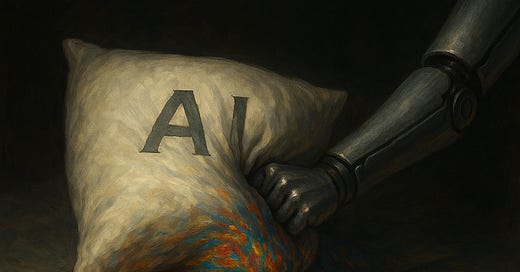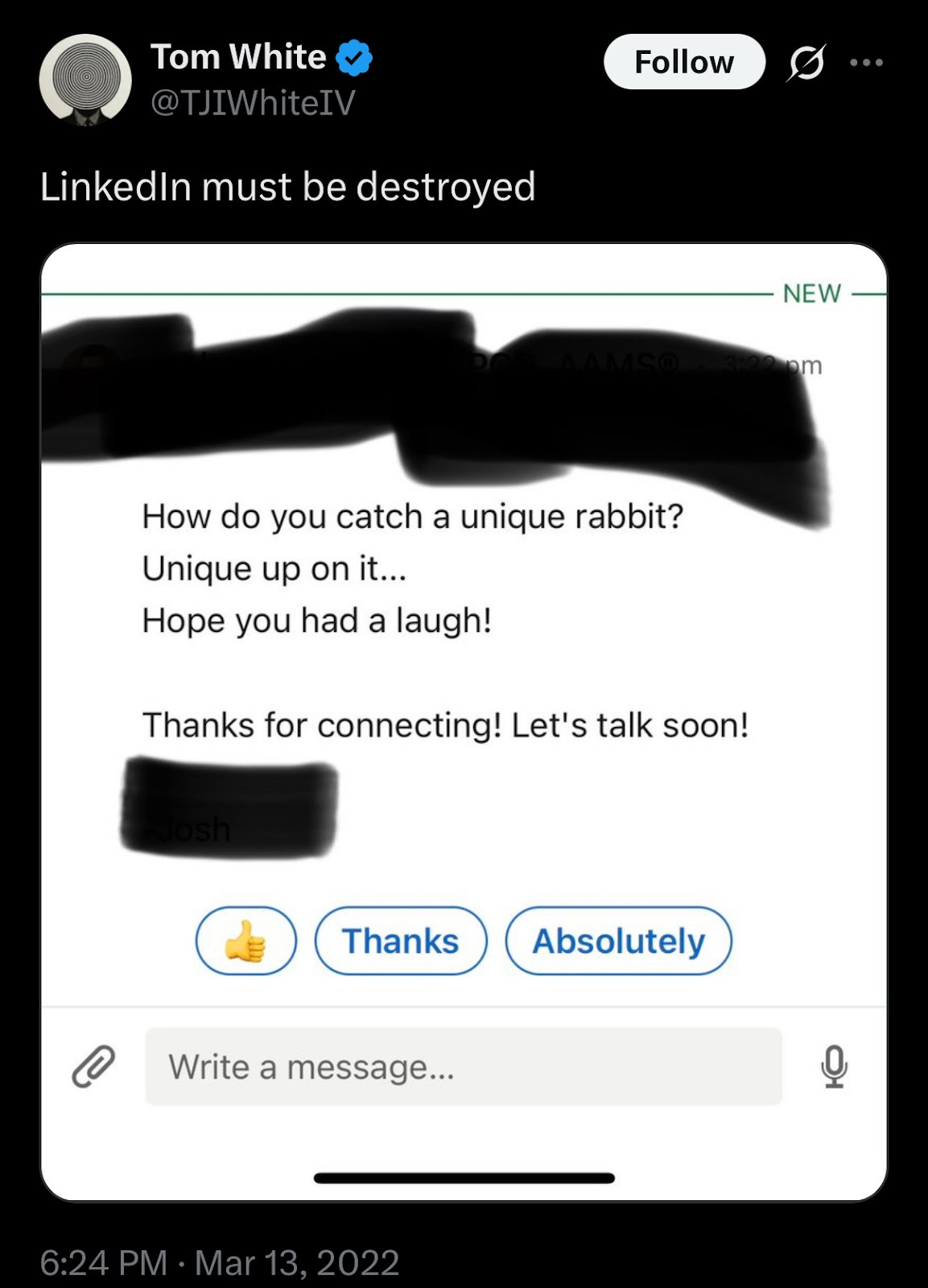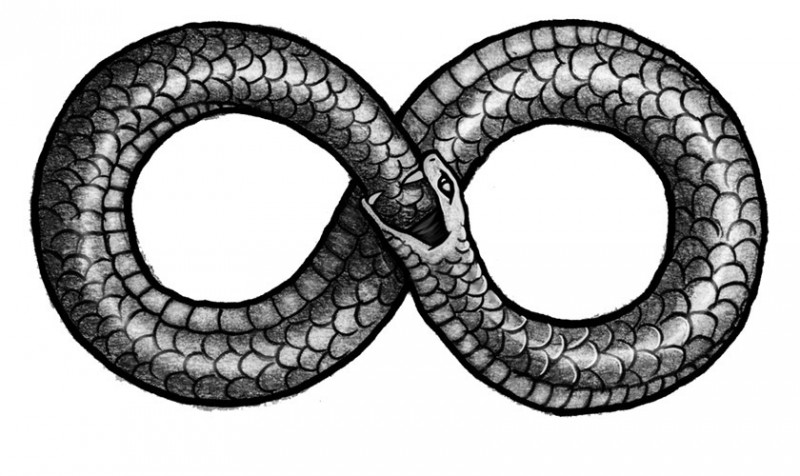The point of modern propaganda isn't only to misinform or push an agenda. It is to exhaust your critical thinking, to annihilate truth.
—Garry Kasparov
The illiterate of the future are not those who can't read or write but those who cannot learn, unlearn, and relearn.
—Alvin Toffler
Above: Creativity's last gasp.
Today's newsletter was co-written with the one and only Kevin Kirkpatrick of Path Nine. Together, we have delved deeply into countless discussions concerning AI, creativity, and the dramatic transformation of the internet. Over recent months, our exchanges have brewed into the thoughts shared in this newsletter.
There was a time when writing online meant something.
When words were wielded by the passionate, not those solely driven by profit or productivity.
When people made things because they had something to say, not something to sell.
Blogs were messy.
Newsletters were niche.
Tweets were raw.
LinkedIn was…nonexistent.
The early internet—those halcyon days of Tumblr and Twitter and MySpace—was imperfect, but at least it was honest.
No longer, I’m afraid.
We’ve barricaded the doors and boarded up the windows, but the call is coming from inside the house.
Today’s creative landscape looks more like a factory floor.
Creators aren’t creators—they’re brands.
Influencers aren’t interesting—they’re optimized.
And everything from your Instagram feed to your inbox has been engineered for engagement, not meaning.
Welcome to the age of creator capture.
It nearly always starts with pure, unbridled passion. A writer or designer or thinker makes something weird and true and real.
It resonates.
It grows.
And then the algorithm kicks in.
Suddenly, the work becomes a performance. What gets clicks becomes what gets made. The edges get sanded down. Originality gives way to imitation. Junk food wins, so everyone starts cooking crap.
And just when it seemed like it couldn’t get worse, AI showed up with a jug of high fructose corn syrup and started pouring it in the deep fryer. To wit:
From Inspiration to Imitation to Industrialization
AI doesn’t just speed things up. Worse, it flattens them.
It takes yesterday’s trends, remixes them with today’s keywords, and spits out tomorrow’s mediocrity. It’s not thinking. It’s rehashing. Recursively, regurgitatively, relentlessly.
When AI trains on AI—which it increasingly does—we’re not just in a loop. We’re in a downward spiral.
It is a recursive nightmare. When the snake begins to eat its tail eventually, it devours itself.
Bad input begets bad output.
Sure, the internet isn’t empty; it’s just no longer for us.
Its content is made of, by, and for bots—an echo chamber of tinny, machine-churned noise—that now make up the majority of all internet traffic.
The content gets smoother, faster, and emptier. And we start to lose our taste for the real; that is, “a desire for spiritual and cultural renewal, artistic excellence, and generative entrepreneurial endeavors, ordered toward the flourishing of the human person.”
This image comes to mind:
By demanding no effort, AI seduces us with easy gains, leaving our cognitive potential unchecked. And thus, our attention spans wither; complexity falls out of favor; and creativity begins to capitulate
From Culture to Clickbait
Influencers have already transformed the internet into a dopamine market. AI is just scaling the slop.
Creators who once had vision now chase virality. Depth is rare. Speed wins. Authenticity gets optimized away. Anu Atluru said it brilliantly:
We create more than ever, but it weighs nothing.
AI now promises results without the reckoning, but frictionless creation leads to weightless rewards. No one dreams of merely pushing a button to generate their magnum opus. The output matters, but the intention, the struggle, the care is what makes it count — what gives it weight…
Weight is tangible in the physical world—a place we should care about and create more for than we have of late, even if it’s harder to scale. Working with your hands, with weight, shape, and dimension, holds an abundance of untapped virtue and value. Online, by nature, weight is harder to find, harder to hold on to, and only getting harder in a world where it feels like anyone can make anything.
But it is just as imperative.
People ask, "What are you working on?" They’re really asking: What’s your endgame? (It’s one of my favorite questions, too.)
My answer is simple, but not easy:
Make something heavy.
Our soliloquy has now become one long, infinite scroll.
Love letters are now texts.
Reactions, just taps.
Presence has been replaced by pings.
We’re not educating anymore. We’re engaging. Or worse, enraging.
Rage bait and SEO hacks.
Noise over signal.
Sugar over substance.
The platforms reward it.
The algorithms amplify it.
And we, the audience, play along like useful idiots: scrolling, sharing, forgetting ad nauseam.
Victor Hugo's words come to mind:
Everything being a constant carnival, there is no carnival left.
Because the truth is: we’re complicit.
We reward the junk by eating more of it because we have developed both a taste for and addiction to it.
We are a culture in decline, or at least in the midst of creative stagnation—gorging on bread that does not satisfy and circuses that no longer entertain.
What Do We Do?
We can’t unplug. We can’t rewind. But we can resist.
Cut ties with hollow content and let your attention endorse quality.
Champion authenticity by extolling the raw and unreplicable.
Use AI as a tool, not a replacement. Let it inspire you, but do not lean upon it entirely .
Create like it matters. Not for clicks, but for craft, for clarity, and for connection.
Because if we don't stay mindful, we risk losing the messy, human process of making something that matters.
The Death of Creativity Isn’t a Murder. It’s Surrender
The shift from genuine creation to mere production is something we’re witnessing unfold right before us. We didn’t lose creativity. We gave it away in exchange for scale, clout, and convenience.
And now we’re watching it suffocate under the weight of its own success.
AI didn’t start this. But it will finish it unless we step in.
In Ulysses, James Joyce wrote: “Think you’re escaping and run into yourself. Longest way round is the shortest way home.”
We must choose the “longest way round” because meaning is neither fast nor viral nor optimized.
It’s made. Slowly. Painfully. Honestly.
By humans.
Per my about page, White Noise is a work of experimentation. I view it as a sort of thinking aloud, a stress testing of my nascent ideas. Through it, I hope to sharpen my opinions against the whetstone of other people’s feedback, commentary, and input.
If you want to discuss any of the ideas or musings mentioned above or have any books, papers, or links that you think would be interesting to share on a future edition of White Noise, please reach out to me by replying to this email or following me on Twitter X.
With sincere gratitude,
Tom








Man, I love reading this kind of stuff. Thanks so much for writing it. That gray scale pictures as an analogy of the impending grayscale world we have waiting for us as AI starts feeding of other AI into perpetuity hit me like a ton of bricks.
What do you think the role of criticism is in all of this? I can't help but think that the critical thinking skills are a big part of what's lacking out there in the world and why people can't tell the difference between the vapid empty bullshit and the good stuff. Do they just need help parsing out the differences?
love this so much! thank you